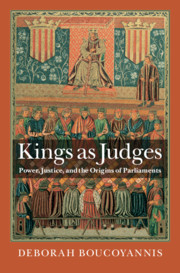Book contents
- Kings as Judges
- Kings as Judges
- Copyright page
- Contents
- Figures
- Tables
- Preface and Acknowledgments
- Part I The Origins of Representative Institutions: Power, Land, and Courts
- 1 Introduction: From Roving to Stationary Judges
- 2 A Theory of Institutional Emergence: Regularity, Functional Layering, and the Origins of Parliament
- 3 Explaining Functional Layering and Institutional Fusion: The Role of Power
- Part II The Origins of Representative Practice: Power, Obligation, and Taxation
- Part III Trade, Towns, and the Political Economy of Representation
- Part IV Land, Conditionality, and Property Rights
- Part V Why Representation in the West: Petitions, Collective Responsibility, and Supra-Local Organization
- Bibliography
- Index
1 - Introduction: From Roving to Stationary Judges
from Part I - The Origins of Representative Institutions: Power, Land, and Courts
Published online by Cambridge University Press: 18 June 2021
- Kings as Judges
- Kings as Judges
- Copyright page
- Contents
- Figures
- Tables
- Preface and Acknowledgments
- Part I The Origins of Representative Institutions: Power, Land, and Courts
- 1 Introduction: From Roving to Stationary Judges
- 2 A Theory of Institutional Emergence: Regularity, Functional Layering, and the Origins of Parliament
- 3 Explaining Functional Layering and Institutional Fusion: The Role of Power
- Part II The Origins of Representative Practice: Power, Obligation, and Taxation
- Part III Trade, Towns, and the Political Economy of Representation
- Part IV Land, Conditionality, and Property Rights
- Part V Why Representation in the West: Petitions, Collective Responsibility, and Supra-Local Organization
- Bibliography
- Index
Summary
This book argues that justice rather than taxes was at the foundation of representative governance. The historical origins of representative institutions are typically sought in a fiscal bargain that pitted resource-poor rulers against subjects recently empowered through the growth of commercial wealth. Such an approach, however, fails to explain why representative institutions would become regular (since taxation was irregular), how social groups solved their collective action problem in resisting the ruler, and how exchanges with resource holders extended to include the whole polity. Acknowedging the role of justice in the emergence of representative institutions allows us to address these concerns. This requires, however, first noting that outcomes of interest often originate in conditions that are inversely related. This is defined as the normative/empirical inversion and is examined in connection to the importance of central power, the constitutional separation of powers, and the security of property rights. In all, state power emerges as paramount in securing constitutional outcomes. The chapter thus also makes the case for England as a strong state. It then provides a summary of the argument and concludes with a discussion of the case selection.
Keywords
- Type
- Chapter
- Information
- Kings as JudgesPower, Justice, and the Origins of Parliaments, pp. 3 - 27Publisher: Cambridge University PressPrint publication year: 2021

